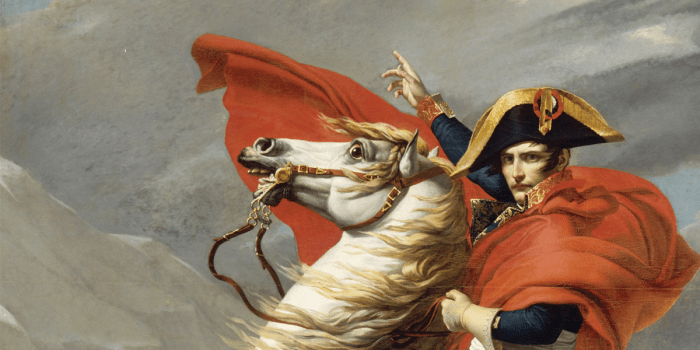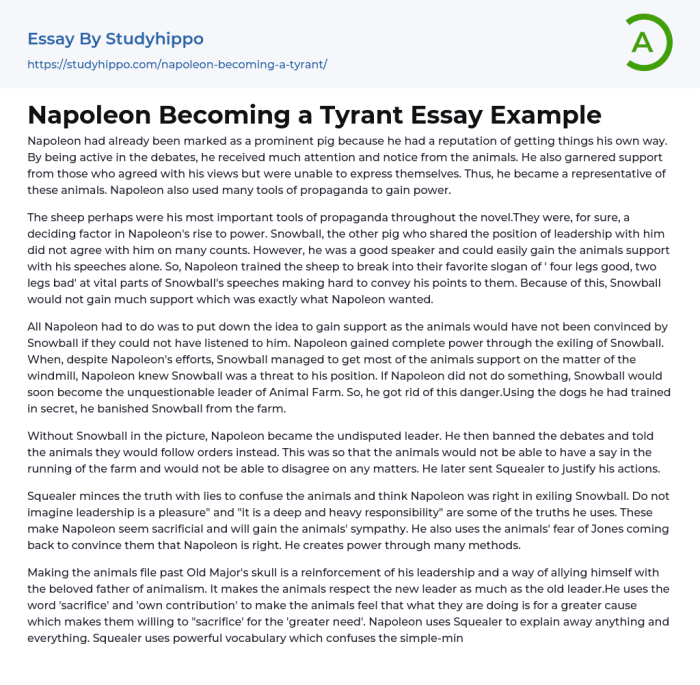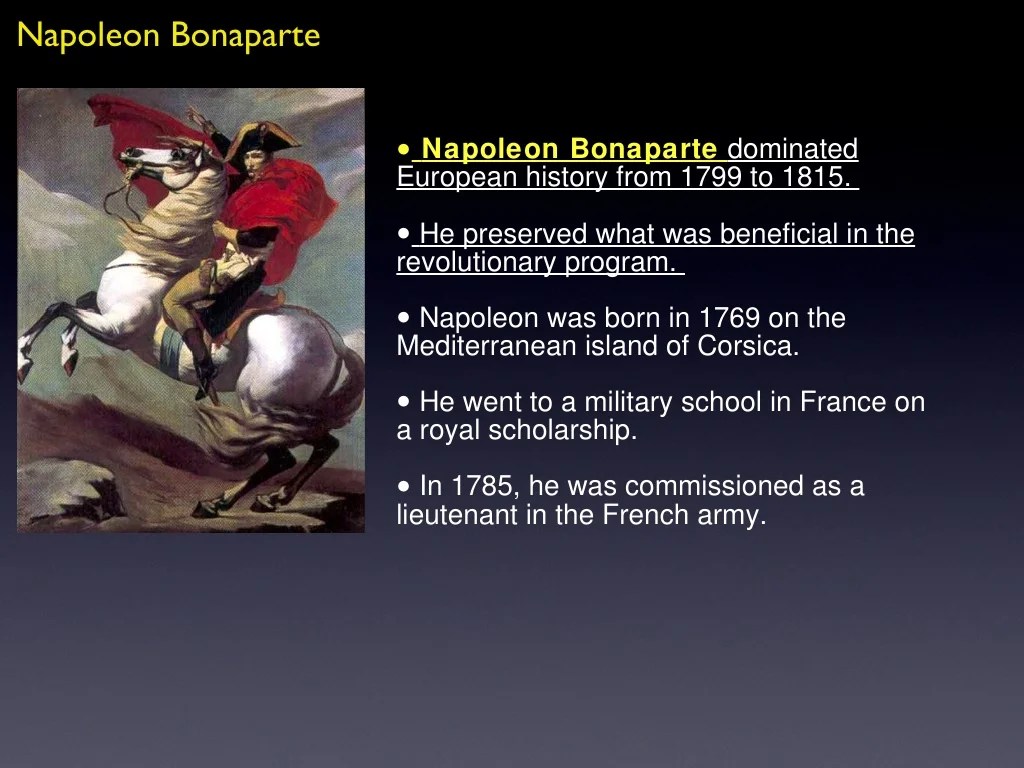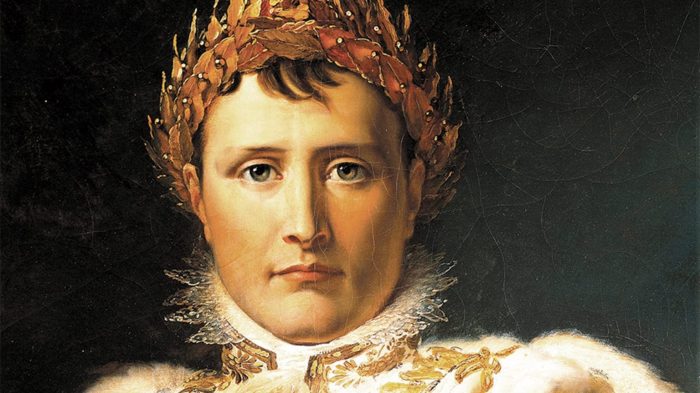Was napoleon a hero or tyrant essay – The title “Napoleon: Hero or Tyrant?” encapsulates the enduring debate surrounding one of history’s most enigmatic figures. Napoleon Bonaparte’s military genius and transformative reforms left an indelible mark on France and Europe, but his authoritarian rule and relentless pursuit of power have cast a shadow over his legacy.
This essay delves into the complexities of Napoleon’s character and explores the contrasting perspectives on his impact on French and European history.
From his humble beginnings to his meteoric rise as Emperor of France, Napoleon’s life was marked by both brilliance and brutality. His military campaigns revolutionized warfare, but his conquests came at a great cost in human life. As a domestic ruler, he implemented sweeping reforms that modernized France, but he also stifled dissent and curtailed civil liberties.
Napoleon’s Military Victories and Conquests

Napoleon Bonaparte’s military career was marked by unprecedented success and innovation. He rose from obscurity to become one of the most successful military commanders in history, leading France to victory in numerous wars and expanding its empire across Europe.
Napoleon’s military strategies and tactics were groundbreaking for their time. He emphasized mobility, artillery, and concentrated firepower, which allowed him to outmaneuver and defeat his opponents. His most significant battles and victories include the Battle of Austerlitz (1805), the Battle of Jena-Auerstedt (1806), and the Battle of Wagram (1809).
Napoleon’s Early Military Career
Napoleon began his military career as a young artillery officer in the French army. He quickly distinguished himself through his brilliance and bravery, and was promoted to general at the age of 24. In 1796, he was given command of the Army of Italy and led it to a series of stunning victories over the Austrian and Sardinian armies.
Napoleon’s Military Strategies and Tactics
Napoleon’s military strategies were based on the principles of concentration, mobility, and artillery. He believed in concentrating his forces at a single point, overwhelming the enemy with superior numbers. He also emphasized the importance of mobility, using cavalry and artillery to outmaneuver and defeat his opponents.
Napoleon’s artillery was also a key factor in his success, as it allowed him to inflict heavy casualties on the enemy from a distance.
Napoleon’s Most Significant Battles and Victories
- Battle of Austerlitz (1805):Napoleon’s victory over the combined armies of Austria and Russia solidified his position as one of the greatest military commanders in history.
- Battle of Jena-Auerstedt (1806):Napoleon’s decisive victory over Prussia led to the collapse of the Prussian army and the occupation of Berlin.
- Battle of Wagram (1809):Napoleon’s victory over Austria at Wagram forced the Austrians to sign the Treaty of Schönbrunn, which gave France control over much of Central Europe.
Napoleon’s Domestic Policies and Reforms

Napoleon Bonaparte implemented a series of comprehensive reforms that profoundly transformed French society and government. These reforms encompassed administrative, legal, and economic spheres, aimed at modernizing and centralizing France.
Administrative Reforms, Was napoleon a hero or tyrant essay
Napoleon established a centralized administrative system, replacing the complex and inefficient feudal structure with a hierarchical bureaucracy. He created departments and prefects, ensuring direct control over local administration. This streamlining of governance improved efficiency and strengthened the central government’s authority.
Legal Reforms
The Napoleonic Code, enacted in 1804, was a comprehensive legal framework that replaced the patchwork of laws and customs that had existed previously. It established principles of equality before the law, freedom of religion, and the protection of private property.
The Code became a model for legal systems across Europe, promoting uniformity and clarity in legal proceedings.
Economic Reforms
Napoleon introduced economic reforms to stimulate growth and stability. He established the Bank of France, providing a central banking system to regulate the economy. He also promoted infrastructure development, including the construction of roads and canals, to facilitate trade and communication.
Additionally, he implemented tariffs and other measures to protect French industries from foreign competition.These reforms had a profound impact on French society. They created a more centralized and efficient government, promoted equality and legal protections, and stimulated economic growth. Napoleon’s efforts to modernize and centralize France left a lasting legacy, shaping the country’s political and economic structures for generations to come.
Napoleon’s Impact on European History: Was Napoleon A Hero Or Tyrant Essay

Napoleon Bonaparte’s impact on European history was profound and multifaceted. His role in the French Revolution, his influence on the spread of Enlightenment ideas, and the impact of his conquests on the European political landscape left a lasting legacy.
Napoleon’s Role in the French Revolution and Its Aftermath
Napoleon emerged as a military leader during the French Revolution. His victories in Italy and Egypt propelled him to prominence, and in 1799, he seized power in a coup d’état. As First Consul, Napoleon established a new constitution that centralized power and expanded the authority of the state.
He also implemented a series of reforms that modernized France, including the introduction of a new legal code, the Code Civil, and the establishment of a national education system.
Napoleon’s Influence on the Spread of Enlightenment Ideas
Napoleon was a product of the Enlightenment, and his conquests helped to spread its ideals throughout Europe. The French armies carried with them the principles of liberty, equality, and fraternity, which inspired revolts against traditional monarchies. Napoleon’s patronage of science and the arts also contributed to the dissemination of Enlightenment ideas.
The Impact of Napoleon’s Conquests on the European Political Landscape
Napoleon’s military campaigns had a profound impact on the European political landscape. His victories led to the collapse of the Holy Roman Empire and the redrawing of borders across Europe. Napoleon established client states in Italy, Germany, and Poland, and his conquests spread French influence throughout the continent.
Napoleon’s Legacy and Historical Perspectives

Napoleon Bonaparte, the French military leader and emperor, remains a controversial figure in history. His legacy is a complex mix of military brilliance, political ambition, and authoritarian rule.
Contrasting Views of Napoleon
Napoleon has been portrayed both as a hero and a tyrant. His military victories and reforms brought glory to France and spread the ideals of the French Revolution across Europe. However, his dictatorial rule and wars of conquest led to widespread suffering and political instability.
Positive Contributions
Napoleon’s positive contributions include:
- Military victories that expanded French territory and prestige.
- Introduction of the Napoleonic Code, a comprehensive legal system that influenced lawmaking worldwide.
- Establishment of a centralized and efficient government in France.
Negative Contributions
Napoleon’s negative contributions include:
- Wars of conquest that resulted in the deaths of millions of people.
- Suppression of political dissent and the establishment of a dictatorship.
- Economic exploitation of conquered territories.
Ongoing Debate
The debate over Napoleon’s legacy continues today. Some historians view him as a great military leader and a progressive reformer, while others condemn him as a ruthless dictator and a warmonger. His impact on French and European history remains profound, and his legacy is still debated and interpreted in different ways.
General Inquiries
Was Napoleon a good leader?
Napoleon was a charismatic and effective leader who inspired loyalty and devotion in his followers. He possessed a keen military mind and a remarkable ability to motivate his troops. However, his authoritarian rule and disregard for civil liberties have led some historians to question his leadership qualities.
What were Napoleon’s greatest achievements?
Napoleon’s military victories and conquests transformed the political landscape of Europe. He established the French Empire, introduced the Napoleonic Code, and promoted the spread of Enlightenment ideas. His reforms modernized France and laid the foundation for its future economic and social development.
What were Napoleon’s greatest failures?
Napoleon’s relentless pursuit of power led to his downfall. His invasion of Russia in 1812 proved to be a disastrous failure, and his subsequent defeat at the Battle of Waterloo ended his reign. His authoritarian rule and suppression of dissent alienated many of his supporters and contributed to his eventual downfall.